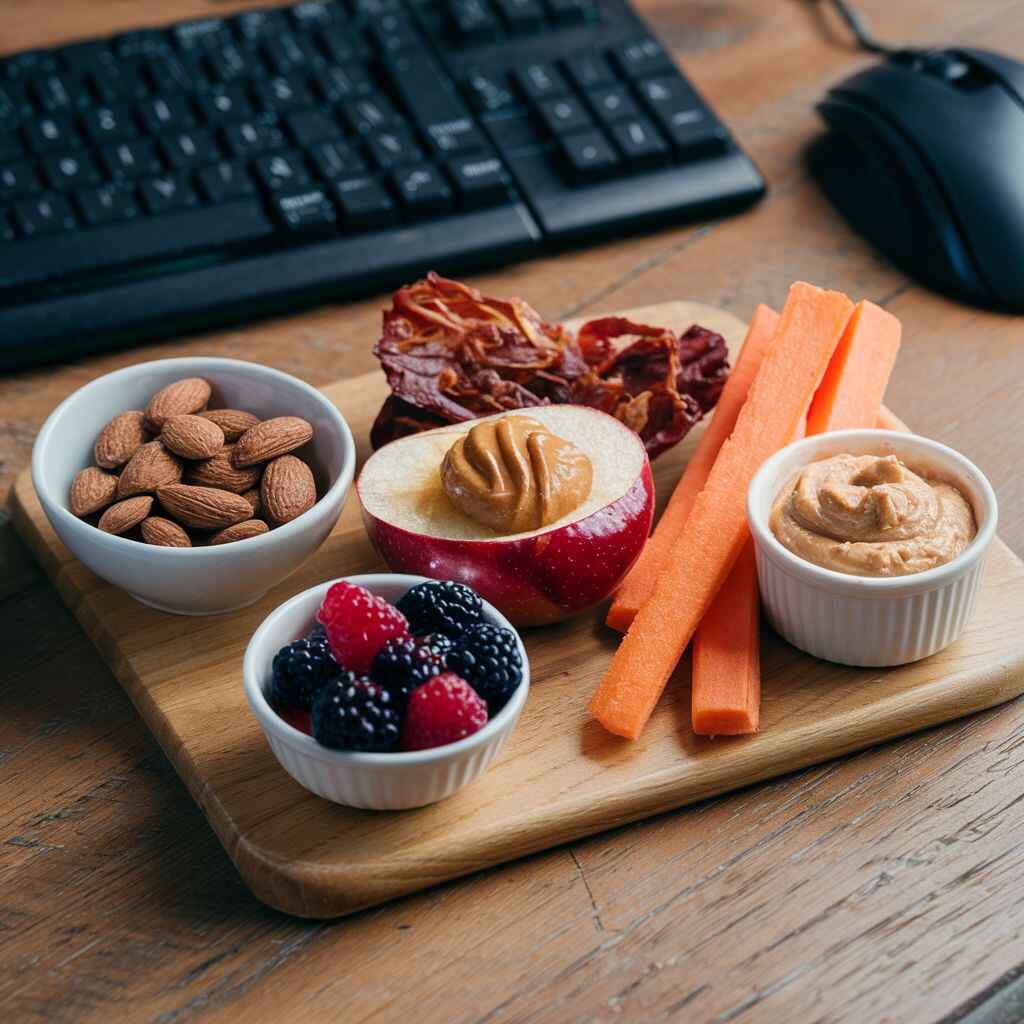In today’s fast-paced world, busy professionals often find themselves grappling with the challenge of maintaining a healthy diet amidst their packed schedules.

The quest for convenience often leads us down the path of fast food and vending machine snacks, sidelining the nutritional needs that are fundamental to our energy, productivity, and overall health. But fear not! Incorporating healthy eating habits into your daily routine doesn’t have to be a Herculean task. Here are 10 Easy Healthy Eating Habits for Busy Professionals, actionable tips to help you eat healthier without compromising your busy lifestyle.
1. Plan Your Meals in Advance
Set aside some time during the weekend to plan your meals for the week. This could include drafting a meal plan and preparing a shopping list. Meal planning helps you make intentional food choices, reduces the temptation to grab something quick (and often unhealthy), and can even save you time and money.
Pro Tip: Consider theme nights, like “Meatless Monday” or “Taco Tuesday,” to simplify decision-making.
2. Embrace Meal Prep
Dedicate a few hours on the weekend to prepare and cook meals in bulk. Divide these into individual portions and store them in the fridge or freezer. This approach ensures that you have healthy, ready-to-eat meals on hand throughout the week.
3. Keep Healthy Snacks Handy

Stock your office, car, and bag with healthy snack options like nuts, fruit, yogurt, or whole-grain crackers. Healthy snacks can help curb hunger, provide energy, and prevent overeating at meal times.
Snack Ideas:
- Almonds or walnuts
- Sliced apples with peanut butter
- Greek yogurt with honey and berries
- Vegetable sticks with hummus
4. Stay Hydrated

Keep a reusable water bottle with you at all times. Staying hydrated is crucial for overall health, energy levels, and can even help with weight management by reducing unnecessary snacking.
Hydration Tip: Add slices of lemon, cucumber, or mint leaves to your water for an extra flavor boost.
5. Practice Mindful Eating
Take the time to eat without distractions. This means stepping away from your desk and focusing on your meal. Mindful eating can help you enjoy your food more and recognize when you’re full, preventing overeating.
6. Opt for Whole Foods
Whenever possible, choose whole, unprocessed foods. These are packed with essential nutrients and are more satisfying than processed foods, helping you to eat less and feel better.
Examples:
- Fruits and vegetables
- Whole grains like brown rice and quinoa
- Lean proteins like chicken, fish, and legumes
7. Limit Sugar and Processed Foods

Reduce your intake of sugary drinks, snacks, and processed foods. These are often high in calories but low in nutritional value and can contribute to energy slumps and weight gain. There are several healthy alternatives to sugar that can satisfy your sweet tooth without the negative health impacts associated with high sugar consumption. Remember, even natural sweeteners should be used in moderation as part of a balanced diet.
8. Make Smart Choices When Eating Out
Opt for healthier options when dining out. Most restaurants offer nutritious choices that are rich in vegetables, lean proteins, and whole grains. Don’t be afraid to ask for modifications to your meal, such as dressing on the side or substituting fries with a salad.
9. Listen to Your Body
Acknowledging hunger and fullness cues is key to maintaining a healthy relationship with food and your weight. Eating when truly hungry, and controlling when full, will help ensure a successful weight management regimen as well as better outcomes overall.
10. Prioritize Breakfast
Start your day with a nutritious breakfast. It can kick start your metabolism, help you concentrate better, and prevent binge eating later in the day.
Breakfast Ideas:
- Overnight oats with berries and nuts
- Whole-grain toast with avocado and poached egg
- Smoothie with spinach, banana, and protein powder
Takeaways:
Incorporating these 10 healthy eating habits into your routine can lead to significant improvements in your health, energy levels, and productivity. Remember, making small changes gradually can lead to lasting habits over time. So, start with a few of these strategies and build from there. Your body (and your schedule) will thank you!
FAQs:
Q: How can I eat healthy with no time to cook?
Meal prep is a game-changer for busy individuals. Preparing meals in bulk and using healthy shortcuts like pre-cut vegetables or canned beans can save you time.
Q: What are some quick healthy breakfast options?
Overnight oats, smoothies, whole-grain toast with avocado, and Greek yogurt with fruit are all quick, nutritious options.
Q: How do I resist unhealthy snacks at work?
Keep healthy snacks on hand to satisfy hunger between meals, and try drinking water or tea to see if the craving passes.
Remember, the journey to a healthier lifestyle doesn’t require perfection. It’s about making better choices, one meal at a time.
Related Articles:
Smart Healthy Eating Habits – Embrace a Healthy Lifestyle
Top 5 Veggie Super foods | Vegetables for Radiant Health
